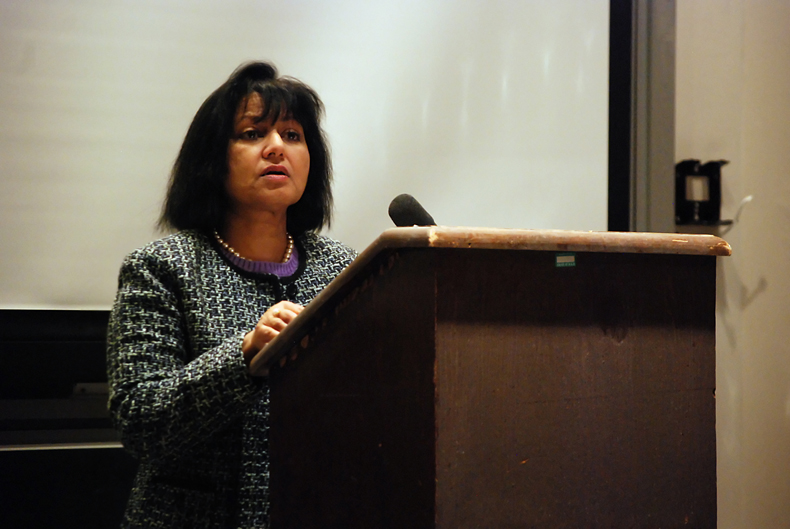The classroom at the Marshall-Wythe School of Law was completely full on Tuesday, Feb. 21, with students and community members seated on chairs and the floor, some even standing for the full hour-long lecture. Everyone in the room listened intently to Indiana University, Bloomington Professor Asma Afsaruddin emphasize the importance of learning from the past in the Islamic political system.
“Muslims, much like any other group, envision the future based on how they remember the past,” Afsaruddin said in her lecture, the second of two she delivered at the College of William and Mary last week.
Afsaruddin, chair and professor of the Department of Near Eastern Languages and Cultures at Indiana University Bloomington, was this year’s Kraemer Middle East Distinguished Scholar-in-Residence. Her presentations were titled “Reviving the Caliphate: Debating Just Governance in Islam” and “Competing Visions of the Shari’a: The Real Clash in the Islamic World.” In both lectures, Afsaruddin focused on the way that the history of Islam establishes the potential for a more liberal Islamic society.
“The eclectic nature of the Islamic political tradition as described so far provides hope for the present and future,” Afsaruddin said in her first lecture. “I remain an optimist, despite setbacks that have occurred recently.”
Afsaruddin also discussed the conflicting views of modernist and hard-line Islamists, explaining that this difference has become especially important in recent years.
“In recent times, liberal and modernist Islamists have taken issue with the positions adopted by the hard-line Islamists,” Afsaruddin explained.
She added that the modernists differ from hard-liners in that many want an ethical government that operates with the consent of the people.
“Modernists … tend to insist on three cardinal principles,” Afsaruddin said. “In English, I tend to call them the three C’s: consultation, consent and consensus.”
She explained that while modernists see hope in a potentially democratic political future of Islam, in which the government would ask the people for input and women would have increased rights, hard-liners often reject ideas that are not their own and refuse to change the current political system.
Kenan Professor of umanities and religious studies Tamara Sonn, who has known Afsaruddin for some years, invited her to speak at the College.
“As a member of the Middle Eastern faculty and a scholar of Islamic studies, I was able to identify a member of the field of Middle Eastern studies, and I was allowed to invite Professor Afsaruddin,” Sonn explained.
Both of Afsaruddin’s lectures had a wide variety of audience members, including undergraduate students, law students and many people from the community. In the question-and-answer session following each presentation, audience members asked questions about topics ranging from the differences in developments of the Bible and the Quran to the future of specific Middle Eastern countries.
Jean-Paul Theroux, J.D. ’14, who attended the second lecture, said he appreciated the way that the content of Afsaruddin’s presentation connected with certain topics and discussions from his classes.
“There’s a group of us studying Islamic law here at the law school, and she addressed a lot of the really contentious issues that have been coming up in class,” he said. “I thought it was really excellent.”
Sonn said she was very pleased with the way the entire event worked out.
“I thought the lecture was brilliant, the turnout was wonderful, and it was a tremendous contribution to the ongoing discussion of Middle Eastern studies on campus,” Sonn said.
Afsaruddin agreed with Sonn that her presentations at the College were an overall success.
“I thought it went well,” she said. “I was impressed by the number of people who actually turned out. The students asked really good questions, they clearly engaged with the nature of the topic.”
She said she was also excited about the atmosphere of the College as a whole.
“I have been very favorably impressed with the students, the faculty and the colleagues of Professor Sonn,” she said. “My impression is that this is a very intellectually stimulating place to be. I’m impressed with the fact that the Middle Eastern field here seems to be growing, and that seems especially important given the political climate and the current events going on in the world.”

